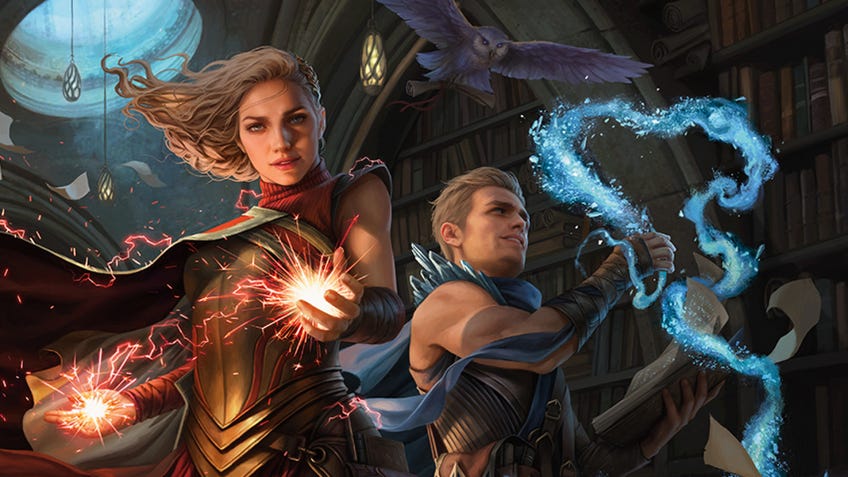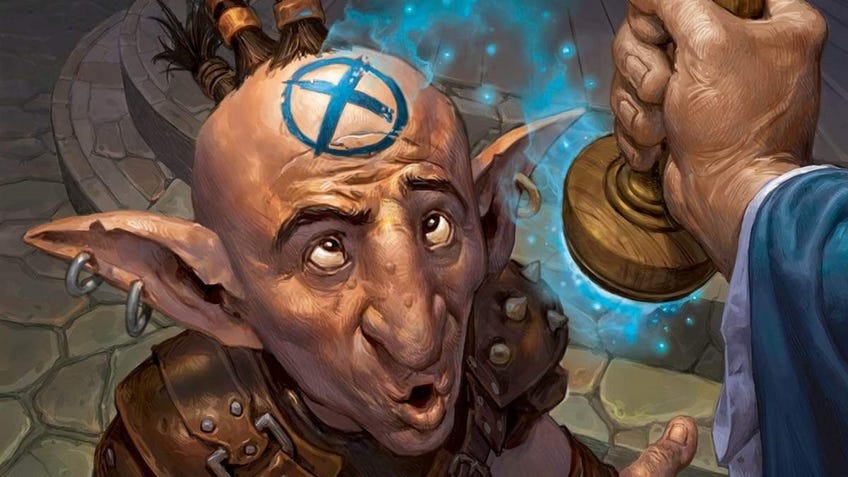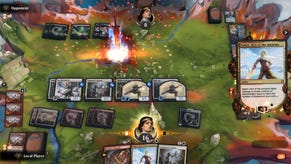Magic: The Gathering dissolves its Pro League to “focus on bottom up growth”
Currently no details or date for replacement structure
Wizards of the Coast announced in a blog post May 13th that the current Magic Pro League season would be the last, at least in its current state. The publisher is shuttering its top level of organised play for trading card game Magic: The Gathering but has not yet offered an alternative structure for 2022.
The current Magic Pro League season will continue as normal with competitors vying for pieces of a $1,000,000 (£708,915) prize pool, but instead of the top performers earning a slot in the next season’s League play they will qualify for an open placement at the Magic World Championship XXVII. The publisher also canceled League Weekends and the postseason Gauntlet events, which provided chances for fans to spectate qualifying and postseason matches, respectively.
Wizards said in the statement that it wants to “successfully transition from the current system in the upcoming season” by sunsetting most of the existing structure and allowing the publisher “the freedom and flexibility to create a new play system for the future.” It did not say when that new model would be implemented but did elaborate on that eventual replacement’s goal.
The company will focus more energy on local and regional tournaments - ostensibly leaning on FLGS locations - and find ways to weave in digital events so that those players who rely on or prefer online Magic won’t be left out. They will also expand tournaments and professional events to include more options like CommandFest, which is dedicated to the player-created and extremely popular Commander format. Whether that means embracing more fan-favourite formats, such as Historic and Pioneer, or replace the soon-to-be-canned Rivals league was - again - not made clear.
Wizards of the Coast replaced the 20-year-old Pro Tour model in 2018, replacing it with the current Magic Pro League system as a way to expand Magic: the Gathering further into the esports model. Responses from fans and professional players express a desire to return to the Pro Tour model, even if that outcome seems highly unlikely.
A frequent criticism of this move is that without a clear path to the professional ranks for general players, Magic: The Gathering as a career choice has been rendered obsolete. “We were told and given permission to say that we should no longer consider Magic professionally moving forward,” pro player Michael Sigrist said on Twitter. The official Magic Esports account corroborated this in numerous replies to fans.

“[Organized Play] will not be explicitly designed to support competitive Magic as a career path. However, there will be Grand Prix, PTQ, and Pro Tour – like events,” it said in a tweet. “Our focus will be the amount of play and the prize money, and less focus on the lifestyle or it being economically self-sustaining.”
While the days of professional salaries, appearance fees and other compensation from Wizards of the Coast had been in decline even before the death of the Pro Tour model, the dream of ‘making it’ fueled interest in both watching and competing in organized play for much of the fanbase.
Former pro player and current broadcaster Brian Kibler said in a Twitter thread that he wasn’t surprised Wizards of the Coast would go back to the drawing board given the poor implementation and production of the Magic Pro League. To wit, the latest Strixhaven tournament, which was held through Magic Arena, was plagued with client bugs that forced match restarts, chronically sluggish stream quality and a general feeling of unpreparedness from casters.
In his estimation, the era of streamers and content creators leaves no room for a path to pro or any model wherein Wizards of the Coast funds the professional lifestyle of highly competitive players. “If anything, while the MPL was clearly intended to serve as marketing for MTG Arena, the league’s poor performance juxtaposed with the game’s success raised the question of how important pro play is anyway,” Kibler said.
“Being a Magic pro is likely to look different in the future, and likely to be more about content creation and building a personal brand than about winning tournaments and getting that WotC paycheck,” he continued. “But here's the secret: it always was. How do you think I got to where I am now?”









